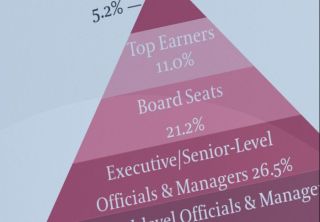 Shaping Successions
Shaping Successions
 Advancing Governance
Advancing Governance
 Discovering Leaders
Discovering Leaders
 Developing Leadership
Developing Leadership
Over the past year, several sizable pension funds and proxy advisory firms have taken a more aggressive stance on gender diversity in the boardroom, threatening to withhold votes or even mount an opposition slate at companies thought to be making insufficient progress on this issue.

Egon Zehnder’s Istanbul office recently convened a group of Turkey-based HR leaders from various sectors for a series of breakfast discussions focused on the importance of team building. Accompanied by the Office Leader Murat Yesildere’s presentation on “Building Highly Effective Leadership Teams”, the participants were very forthcoming creating an open dialogue where they shared their experiences and perspectives on team effectiveness.

The days when the main function of Audit Committees was to put a “stamp of approval” on companies’ financials are long gone. Heightened risk awareness and increased regulation means that Audit Committees must now take on a much more proactive role in detecting, understanding and acting on risk – be it financial, macroeconomic, regulatory, legal or cybersecurity-related.

In today’s environment, boards are expected to fulfillll their traditional oversight and compliance role and also add value through strategic insight and guidance.

Board members today must grapple with increasingly complex matters of strategy and risk. In response, many companies are rethinking board meetings to enhance alignment, energize the board and elevate its performance.

An impending market rebound has many feeling cautiously optimistic, but the extended cycle of the current downturn – now being characterized as “lower for longer” – has created a new reality that will change leadership imperatives for the foreseeable future. Energy leaders are realizing that lower prices, unpredictable market dynamics and hyper competition for talent, resources and capital are driving a need to rebuild and adapt businesses or risk being left behind. In this new reality, it’s critical to strike a balance between disruption and discipline – understanding how to best lead innovation while still adhering to longstanding best practices that will ensure longevity regardless of future market fluctuations.

In 2003, the New York Stock Exchange began to require the boards of listed companies to undergo an annual assessment. At a time when awareness was growing regarding the importance of the board in safeguarding shareholder value, it was thought that this step would provide investors with some transparency regarding how well the board was doing its job.

Most CEOs and boards name succession, both for the CEO and for business unit leaders, as their biggest strategic challenge. While this leadership challenge exists for every industry, it is particularly acute in the consumer sector, where many of the successive waves of disruption first hit.

The prevailing narrative around the Industrial Revolution in its first, second and third iterations is only partly true. Steam power, electricity and modern computing were in fact breakthrough technologies that rapidly came to the fore, disrupting established industries and creating new ones.

How to create positive change in board diversity? What is the role of chairmen in driving the diversity agenda? What advice can a pioneer in the economic empowerment of women give to aspiring female talent?

You are switching to an alternate language version of the Egon Zehnder website. The page you are currently on does not have a translated version. If you continue, you will be taken to the alternate language home page.
Continue to the website